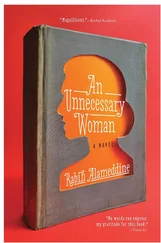Jawad shrugged. Fatima said, “Discretion is boring.”
“My lady,” Khayal said, “our agreement was that I seduce the boy in seven nights, not that I perform the seduction publicly. That would be unfairly humiliating.”
“Love is unfairly humiliating.”
Jawad nodded. “I do not know much of love, but I do know that it is humiliating.”
“I must protest,” Khayal said. “The Prophet — may the blessing of God be upon him — said, ‘He who falls in love and conceals his passion is a worthy man.’ ”
“Being a bore is in itself unappealing,” our heroine said. “Being a bore and a liar to boot makes a man rebarbative, as well as dishonored. Lying with the Prophet’s words? You might as well remove your headdress and shave your beard. The Prophet, peace be upon him, said, ‘He who falls in love, conceals his passion, and is chaste, dies a martyr.’ If you wish to become a martyr, that can be arranged easily, but it is already too late to conceal your passion.”
“And chastity is not what he is after anyway,” Jawad added.
“The desert nights are long and bare,” Fatima said. “Entertain us, or begone. If you desire to possess this boy, you must convince him.”
“Convince me.”
“Move him.”
“Move me.”
“Wait.” Khayal stood up. The light of the fire cast flickering shadows on his long white robe. He was a thick-shouldered man, with a hawkish beak and full, heavy eyebrows. “I will do what you ask if I have to, but allow me one final attempt at convincing you that discretion works best in matters of love. I can tell you the story of Bader, son of Fateh.”
“I am not sure I am willing to be convinced. Are you, my dear Jawad?”
“Well, I do like stories.”
“There you go. The boy likes stories. Tell us the tale of this Bader.”
Khayal said, “There was a Córdoban, from a great family, by the name of Bader ben Fateh. He was a man of faith, circumspect, a gracious host, well mannered, a beacon of good breeding. I was traveling in Játiva when I began to hear of his exploits. It seems he had lost all modesty by falling in love with a musician by the name of Moktadda. I knew this boy, and I can tell you he did not deserve Bader’s love; he did not deserve the love of one of Bader’s slaves. Bader spent a fortune on this honorless dullard, welcomed him into his house, and closed it to his other guests. He plied the peasant with the most expensive wines. I heard that our man had removed his kaffiyeh, unwound his head-rope, showed his full face, rolled up his sleeves.
“He cast off the leash of propriety. He fell prey to that ravenous beast, desire. He became the subject of gossip, a notorious story in the harems, a news item in the diwans. His reputation became the object of derision. He lost his standing, his honor, his respect.
“The young musician had not wanted his indiscretion revealed, and Bader’s loss of social standing made him a less desirable partner. The object of his passion ran away from him altogether, and refused ever to see him again.
“Had Bader valued discretion, had he folded his secret in his heart, couched his desires, he would not have lost everything. He would have worn the robe of well-being, and the garment of respectability would not have become threadbare. He would have been able to keep both his honor and his lover had he chosen a more circumspect style. Allow me a modest approach.”
“Modesty is dull,” Fatima said.
“So was the story,” Jawad said.
“So true. Didactic stories should only be told to children and to the faithful.”
“I weep for the poor children who have to listen to such stories.”
“Are you seduced, my dear Jawad?”
“I am sleepy.”
“Ah, at least the night passes. I pray that we will be gifted with a better seduction tomorrow. And a good night to all.”

My father’s face told a different story. He looked wan, haggard, and old — very old. And thin. His wedding band danced upon its finger like a shower-curtain ring. He had spent an hour telling Lina and me that he felt grand. He was happy that I had flown in to spend Eid al-Adha with him, but we should spend it at our home. He wasn’t ill anymore. He sounded better. He moved around better. He laughed better. He wanted to go home.
The cast of light in the room was disturbing, slightly nauseating. The antiseptic white walls. The fluorescent lights. It was midmorning, but the sallow curtain diffused a pale gray-green glow. Lina had been going out to the balcony to smoke, always making sure the curtain was drawn so my father wouldn’t see her and crave a cigarette.
“I’m doing so much better,” my father announced. “I feel formidable.”
I pulled back the curtain to let some genuine light in, opened the sliding door for air. It was pitch-perfect weather, two clouds maculating a clear sheet of blue, an early spring in February. I stood for a moment with my back to the room, enjoying the play of the flimsy breeze upon my face. I considered for a moment returning to the waiting lounge to relieve Fatima and Salwa, my sister’s daughter, who were entertaining the visitors.
“I know you think I don’t know what I’m talking about,” my father went on, “but I feel better, and I don’t want to spend another night in this godforsaken place.”
The Chinese say prolonged illness can make one a doctor. My mother used to say prolonged illness made one a curmudgeon. My mother was wiser. I turned around and looked at the high nightstand, made sure that her framed passport-sized photo was still there, next to her silver locket, which my father insisted brought him luck.
“We have to wait and find out what Tin Can has to say.” Lina regarded my father with soft eyes. When she was younger, my sister took after my mother, but as she matured, my father’s softer features overcame her face. Lina curled up on the recliner, laid her head back, imitating a Henry Moore sculpture. Her heels poked into the chair’s plastic upholstery.
“Talk to him, darling,” my father whimpered. He grasped the bed rail, pulled himself onto his side in order to face her. He scratched the small protrusion in his chest where the pacemaker and defibrillator were. I turned around again and watched the sky.
My father could afford the best medical care in the world. Lina had dragged him to Johns Hopkins, to the Cleveland Clinic, to Paris, to London. Yet he always returned to the just-competent Tin Can. He didn’t have any illusions in that regard. My father was the one who had dubbed him Tin Can, because he was about as effective a doctor as a tin can. But he was family, Aunt Nazek’s brother, my father’s brother Halim’s wife’s brother, and that to my father was more valuable than credentials or prestigious alma maters. In the last few years, he had refused to travel for medical attention and sought only the family doctor.
I heard my voice speak. “And the doctor told the poor father, ‘The only way to heal your son is to take his heart.’ ”
Their voices joined mine. “ ‘For the evil jinni has made himself a home there.’ ”
My father laughed. “Don’t do this to me.” He clutched his heart, pretending pain. “My evil jinni doesn’t like to be amused.”
“You’re still ever so strange,” my sister said. “What possessed you to think of that? How long has it been since you’ve heard that line? Thirty years?”
“More than that,” my father said. “My father died thirty years ago, and he wasn’t telling those stories of his by then. It must have been thirty-five, maybe thirty-seven years.” He took a raspy breath. “God, Osama, you were such a young boy then.”
Читать дальше













